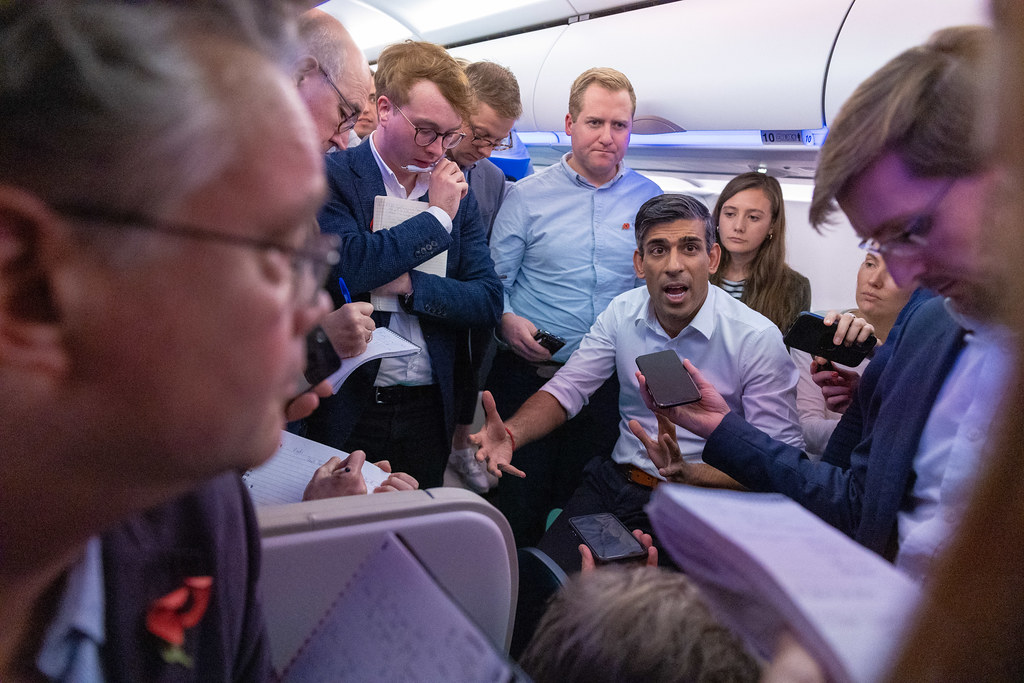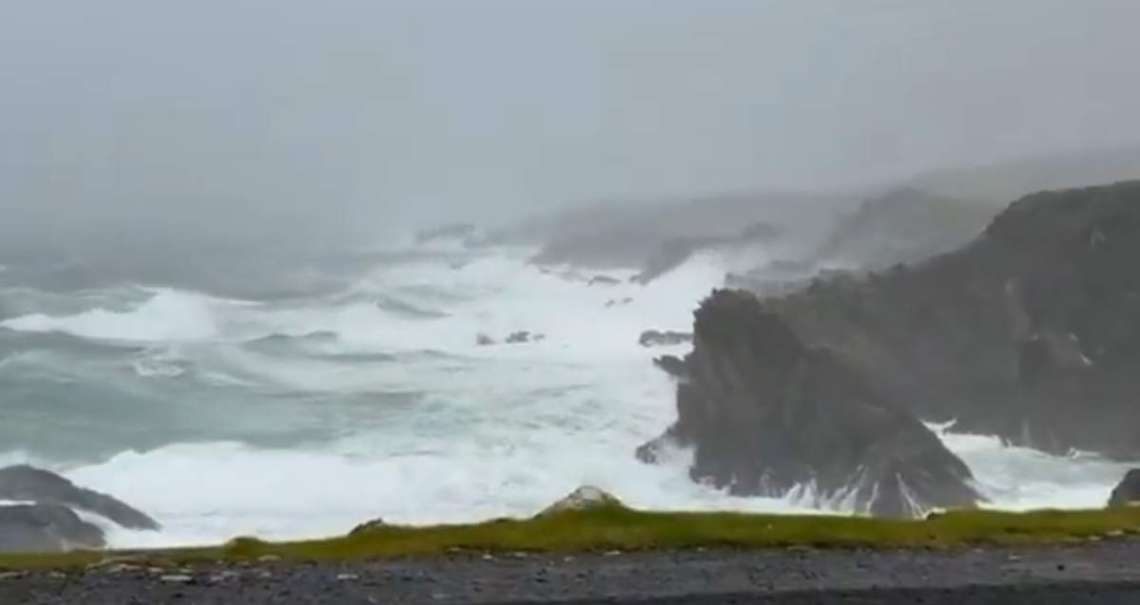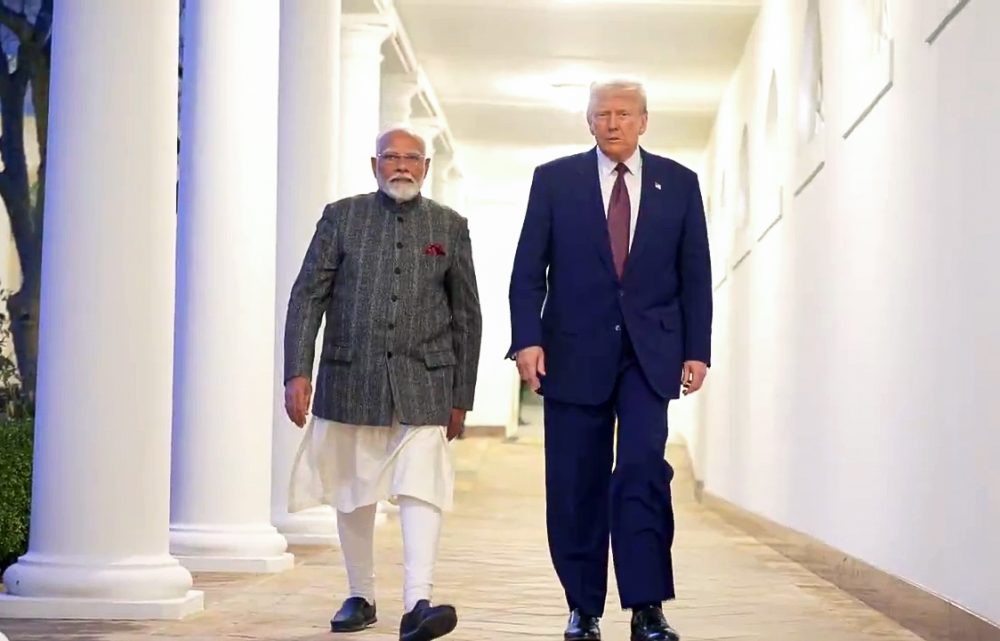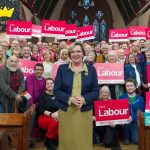Jeremy Hunt and PM set to accept an official recommendation to increase the living wage from £9.50 an hour to about £10.40 an hour…reports Asian Lite News
Prime Minister Rishi Sunak will increase the national living wage and give 8 million households cost-of-living payments worth up to £1,100, The Times reported.
Chancellor of the Exchequer Jeremy Hunt and Sunak will accept an official recommendation to increase the living wage from £9.50 an hour to about £10.40 an hour, nearly a 10% rise, the newspaper reported.
Govt considering increase in energy windfall tax
Finance minister Jeremy Hunt is considering a big increase in a windfall tax on oil and gas firms and extending it to power generation firms as he tries to find ways to repair the country’s public finances.
The idea is “under consideration” ahead of Hunt’s announcement of a new budget plan on Thursday, a government source said, speaking on condition of anonymity.
Under the plan, first reported by The Times, the levy would be increased to 35% from its current rate of 25%. It would also apply to electricity generators and run until 2028 instead of 2025 as currently scheduled.
The newspaper said the tax would raise a total of 45 billion pounds ($53.3 billion) over the next five years.
A senior source at a North Sea producer, who was familiar with the government’s plans, said it was vital that a tax investment incentive was also extended and that the government avoid more tax changes so “investors can have confidence and continue putting cash into major North Sea developments.”
The chairman of Ithaca Energy, a newly listed North Sea oil and gas producer, said on Wednesday that removing incentives to invest in oil and gas would make the British offshore industry uneconomical.
Hunt and Prime Minister Rishi Sunak have warned of tough decisions on tax increases and spending cuts as they try to restore Britain’s economy policy credibility following a bond market sell-off sparked in September by the now largely abandoned tax cut plans of former prime minister Liz Truss.
‘Putting public finances on sustainable trajectory’
The UK economy has “clearly” stabilised, Rishi Sunak has said, as he vowed to deliver on market expectations of shoring up the public finances.
The prime minister said this week’s autumn statement would “put our public finances on a sustainable trajectory”.
Chancellor Jeremy Hunt is set to unveil spending cuts and tax rises to fill a gap in the UK’s finances.
Sunak said he was fixing errors made by his predecessor Liz Truss, whose mini-budget left markets reeling.
The mini-budget in September included about £45bn of unfunded tax cuts and was followed by days of market turbulence, a fall in the value of the pound and rises in the cost of UK government borrowing.
Truss, who later accepted her mini-budget “went further and faster than markets were expecting”, resigned last month after Conservative MPs rebelled against her leadership.
She was replaced by Sunak who, in his first speech as prime minister, said Truss had made “mistakes” and he had been elected by his party “to fix them”.
Speaking to reporters on a plane to the G20 summit in Indonesia – his second foreign trip as PM – Sunak said “financial conditions in the UK have stabilised, clearly”.
He said to maintain that stability, “delivering on the expectations of international markets” and making sure “our fiscal position is on a more sustainable trajectory” were crucial.
“And that’s what we will do,” in the autumn statement, he said.
Speaking in Indonesia, Sunak said the “decisions we make will have fairness and compassion at their heart”, and reiterated that “stability has returned” to the UK.
On Sunday, his chancellor Hunt told the BBC everyone would need to pay “a bit more tax” to put the economy on a firmer footing.
Soaring living costs and a warning from the Bank of England that the UK is facing its longest recession since records began are the backdrop for the chancellor’s forthcoming announcement.
While acknowledging his plan would “disappoint people”, Mr Hunt promised to protect the “most vulnerable” and “make the recession we are in as short and shallow as possible”.
On Sunday, former cabinet minister Simon Clarke said tax rises risked choking off economic growth and suggested balancing the books through spending cuts instead.
Former Chancellor Kwasi Kwarteng echoed that argument last week, saying said growth would not stem from “putting up our taxes”.
They said they were sceptical about the size of the “black hole” in the public finances and said a number of Tory MPs had concerns.
Treasury sources have previously estimated there was a gap of around £55bn in the public finances, but some economists have questioned this.
Prime Minister Rishi Sunak will increase the national living wage and give 8 million households cost-of-living payments worth up to £1,100, The Times reported.
Chancellor of the Exchequer Jeremy Hunt and Sunak will accept an official recommendation to increase the living wage from £9.50 an hour to about £10.40 an hour, nearly a 10% rise, the newspaper reported.
Govt considering increase in energy windfall tax
Finance minister Jeremy Hunt is considering a big increase in a windfall tax on oil and gas firms and extending it to power generation firms as he tries to find ways to repair the country’s public finances.
The idea is “under consideration” ahead of Hunt’s announcement of a new budget plan on Thursday, a government source said, speaking on condition of anonymity.
Under the plan, first reported by The Times, the levy would be increased to 35% from its current rate of 25%. It would also apply to electricity generators and run until 2028 instead of 2025 as currently scheduled.
The newspaper said the tax would raise a total of 45 billion pounds ($53.3 billion) over the next five years.
A senior source at a North Sea producer, who was familiar with the government’s plans, said it was vital that a tax investment incentive was also extended and that the government avoid more tax changes so “investors can have confidence and continue putting cash into major North Sea developments.”
The chairman of Ithaca Energy, a newly listed North Sea oil and gas producer, said on Wednesday that removing incentives to invest in oil and gas would make the British offshore industry uneconomical.
Hunt and Prime Minister Rishi Sunak have warned of tough decisions on tax increases and spending cuts as they try to restore Britain’s economy policy credibility following a bond market sell-off sparked in September by the now largely abandoned tax cut plans of former prime minister Liz Truss.
‘Putting public finances on sustainable trajectory’
The UK economy has “clearly” stabilised, Rishi Sunak has said, as he vowed to deliver on market expectations of shoring up the public finances.
The prime minister said this week’s autumn statement would “put our public finances on a sustainable trajectory”.
Chancellor Jeremy Hunt is set to unveil spending cuts and tax rises to fill a gap in the UK’s finances.
Sunak said he was fixing errors made by his predecessor Liz Truss, whose mini-budget left markets reeling.
The mini-budget in September included about £45bn of unfunded tax cuts and was followed by days of market turbulence, a fall in the value of the pound and rises in the cost of UK government borrowing.
Truss, who later accepted her mini-budget “went further and faster than markets were expecting”, resigned last month after Conservative MPs rebelled against her leadership.
She was replaced by Sunak who, in his first speech as prime minister, said Truss had made “mistakes” and he had been elected by his party “to fix them”.
Speaking to reporters on a plane to the G20 summit in Indonesia – his second foreign trip as PM – Sunak said “financial conditions in the UK have stabilised, clearly”.
He said to maintain that stability, “delivering on the expectations of international markets” and making sure “our fiscal position is on a more sustainable trajectory” were crucial.
“And that’s what we will do,” in the autumn statement, he said.
Speaking in Indonesia, Sunak said the “decisions we make will have fairness and compassion at their heart”, and reiterated that “stability has returned” to the UK.
On Sunday, his chancellor Hunt told the BBC everyone would need to pay “a bit more tax” to put the economy on a firmer footing.
Soaring living costs and a warning from the Bank of England that the UK is facing its longest recession since records began are the backdrop for the chancellor’s forthcoming announcement.
While acknowledging his plan would “disappoint people”, Mr Hunt promised to protect the “most vulnerable” and “make the recession we are in as short and shallow as possible”.
On Sunday, former cabinet minister Simon Clarke said tax rises risked choking off economic growth and suggested balancing the books through spending cuts instead.
Former Chancellor Kwasi Kwarteng echoed that argument last week, saying said growth would not stem from “putting up our taxes”.
They said they were sceptical about the size of the “black hole” in the public finances and said a number of Tory MPs had concerns.
Treasury sources have previously estimated there was a gap of around £55bn in the public finances, but some economists have questioned this.
ALSO READ-Sunak sets out five-point economic action plan for G20














